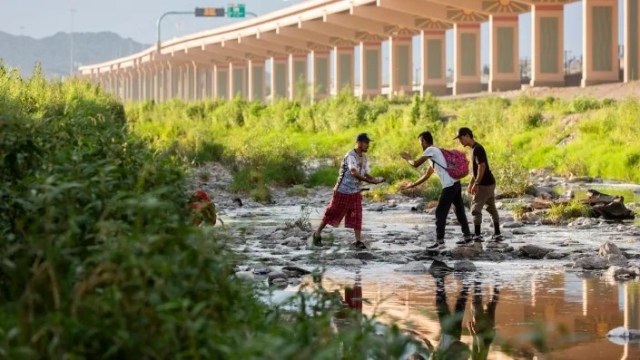
Yasmín Martínez watched her life swing like a cannonball tied to the fate of her country, Venezuela.
By Yahoo News – Lauren Villagran
Sep 14, 2022
Once the owner of a carnicería meat market in Maracaibo, the formerly wealthy capital of Venezuela’s oil industry, Martínez found herself driven to migrate alongside more than a million Venezuelans to Peru where she worked in a candy shop and sent money home for three years. It wasn’t enough, and the discrimination was brutal, she said.
So she joined another massive movement of venezolanos fleeing their dictatorial government and collapsed economy – this time, to Texas.
“I don’t know if Venezuela is going to empty out,” she said, rubbing a backache from sleeping outside El Paso’s Greyhound station in a rain-soaked tent. “So many people have left. My husband said that in the neighborhood where we lived, there was just a terrible loneliness.”
She and her husband, three grown children and extended family were among the more than 900 migrants released by U.S. Border Patrol in Downtown El Paso over the past week. Venezuelans released included families and single adults.
Those released are lawfully pursuing immigration status in the U.S., according to Border Patrol El Paso Sector spokeswoman Valeria Morales. She said CBP runs a background check before releasing anyone and those who pose a public safety risk are detained.
Migrants take shelter at Greyhound bus station in Downtown El Paso
The arrival of an average of 1,300 migrants per day in September is challenging El Paso’s ability to temporarily shelter them and straining relations among city, county and federal authorities. Among those migrants arriving over the past five days are an average of 660 Venezuelans per day, Morales said.
At El Paso’s Greyhound bus station, migrants sheltered overnight in about a dozen donated tents pitched on the sidewalk. Near the U.S.-México border south of El Paso’s Chihuahuita neighborhood, Venezuelans and other migrants were crossing the Rio Grande in large numbers late Tuesday. U.S. Border Patrol began to line them up under the Loop 375 overpass after several crisscrossed back to Juárez for food during the day.
A majority of Venezuelans who have arrived at the Texas border in recent months crossed through Border Patrol’s Del Rio Sector – the same area that a year ago became the site of a large migrant encampment on the banks of the Rio Grande.
In the first 10 months of fiscal 2022, CBP encountered or apprehended more than 130,000 Venezuelan nationals, up from more than 50,000 Venezuelans encountered or apprehended in fiscal 2021.
They are mostly presenting themselves to border agents, in hopes of seeking asylum or other immigration relief. Increasingly, they are presenting their claims in El Paso.
Venezuelans who have arrived in recent weeks say they getting out at a bus station on the south side of Juárez. They’re taking taxis to the border — paying between 500 pesos and 1,000 per person, or about $25 to $50 apiece. Taxi drivers are dropping them within walking distance from the iconic red X sculpture and the Plaza de la Mexicanidad, or west of the puente negro train bridge near Downtown.
There, they wade into the Rio Grande canal that delineates the U.S.-Mexico border and turn themselves in to U.S. border agents.
CBP expelled over 500 Venezuelans under Title 42 in 2022
Morales, of Border Patrol’s El Paso Sector, said the agency is releasing those who cannot be subjected to Title 42.
The U.S. government has expelled a small fraction of arriving Venezuelans under the pandemic-era Title 42 public health policy, likely returned to third countries. The United States suspended its diplomatic relationship with Venezuela in 2019 and cannot easily coordinate expulsion flights.
CBP reported it expelled 530 Venezuelans under Title 42 in 2022, down from nearly 1,300 in fiscal 2021.
Witness at the Border, a grassroots organization that tracks U.S. Immigration and Customs Enforcement expulsion flights doesn’t list Caracas or any Venezuelan city among the 44 removal destinations it has tracked in 2022.
For Martínez and her family, working in Peru became increasingly difficult.
A week’s wages would buy little more than two days’ food in Venezuela, where shopping for basics required sleeping in lines and also carrying a carnet de la patria, or a “homeland card” accessible only to those who pledge fealty to the government of President Nicolás Maduro, said Cristina Martínez, the elder Martinez’s 22-year-old daughter.
…
Read More: Yahoo News – Venezuelan migration overwhelming area shelters; families sleeping on El Paso streets
…

